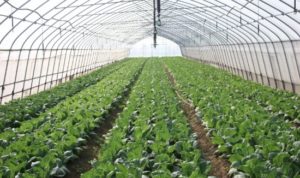Transforming Africa’s agriculture through greenhouse farming: Case study of Ghana
 The call in August 2017, by participants at the end of a “Strategy, Planning and Project Implementation Workshop”, for the promotion of greenhouse farming technology in Ghana was a step in the right direction.
The call in August 2017, by participants at the end of a “Strategy, Planning and Project Implementation Workshop”, for the promotion of greenhouse farming technology in Ghana was a step in the right direction.
This came after the participants had been exposed to the greenhouse farming technology during a visit to the thriving Unique Veg. Farms Limited at Adjei-Kojo near Ashaiman in the Greater Accra Region, where tomatoes and other vegetables were being cultivated.
There are other flourishing greenhouse farms at the Dawhenya, also in the Greater Accra.
According to the participants, the technology would help to eliminate poverty and to address the challenges of food insecurity not only in Ghana but the rest of Africa.
A greenhouse is a structure where crops such as tomato, green beans and sweet pepper are grown under controlled micro environmental conditions.
This method is used to protect the plants from adverse climatic conditions – extreme temperature, wind, precipitation, excessive radiation, pests and disease.
In greenhouse technology, the environmental conditions are modified using greenhouse so that one can grow any plant in any place at any time with less labour.
Mr Joseph T. Bayel, a participant, and a farmer from Sawla-Tuna-Kalba District of the Northern Region, said (in an interview with the writer) that the workshop had enlightened them on modern farming technologies.
“We were taught at the lectures, but I never knew this type of farming is in Ghana. I thought it was something in the white man’s world. In fact, if you are able to do this type of farming, you will be far away from poverty”.
The annual workshop organised by the Institute of Applied Sciences and Technology, University of Ghana, which is part of the Ghana Economic Well-Being Project, was attended by farmers, policy makers and planners, academia, local manufacturers, agribusiness operators and entrepreneurs.
Agricultural transformation is already underway in many African countries and greenhouse farming would enable farmers to use less agricultural inputs, labour and fertilizers. It additionally, enhances pests and disease control.
The technology gives high yield and has high impact in the sustainable jobs space.
The Government of Ghana through the National Entrepreneurship and Innovation Plan (NEIP) hopes to create 10,000 jobs through the establishment of 1,000 greenhouse projects over a four-year period.
According to Mr Franklin Owusu-Karikari, Director of Business Support, NEIP, the project was part of the effort to create jobs for the youth and to increase food production.
NEIP has targeted to create 10,000 direct jobs, 10 sustainable jobs per dome, and also 4,000 indirect sustainable jobs through the production of raw materials and installation of greenhouse domes.
The project would also go a long way to transfer skills and new technology in fruits and vegetable production as well as improved standards in farming and marketing of fruits and vegetables.
Beneficiaries of the NEIP greenhouse farming project would be trained for two years in its management before it would be handed over to them.
According to NEIP, so far 75 greenhouse domes had been constructed at the Dawhyenya.
NEIP is a flagship policy initiative of the government with the primary objective of providing an integrated national support for start-ups and small businesses.
In this era of climate change coupled with the increasing demand for land for estate development at the expense of farmlands, greenhouse farming is the way forward to boost agriculture in Africa.
Vegetable production would gain momentum to meet the demand of both local and foreign markets, if African Governments’ give much attention to the promotion of greenhouse farming technology.
To ensure a successful implementation of the technology, there is the need for massive investment and capacity building of the research institutions and farmers.
Professor Eric Y. Danquah, Founding Director, West Africa Centre for Crop Improvement (WACCI), University of Ghana, speaking at the opening of a two-day workshop on demand-led plant variety design, which was organised by Centre, said high-quality research was needed to improve food and nutrition security in the West African sub-region.
He added that there was the need to rebuild agricultural research capacity in the sub-region to develop our institutions into Centres of Excellence for agricultural innovation for quality research – development of game changing products for the transformation of agriculture in West and Central Africa.
Greenhouse farming is a powerful technology that governments could use to attract the many unemployed youth into agriculture, thereby enabling them to contribute their quota to the continent’s socioeconomic development.
The economy of countries like the Netherlands and Brazil are doing marvellously well, due to the thriving greenhouse farming technology.
According to the latest report from the United Nations’ Food and Agriculture Organisation, 233 million people in sub-Saharan Africa were undernourished in 2014-16.
This hunger situation can be reversed if African governments invest massively in agriculture and agricultural research and capacity building.
Africa cannot afford to be left behind in this era of technological advancement in agriculture, and the way to go is greenhouse farming.
By Iddi Yire, GNA
Source: GNA
